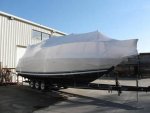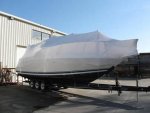iboats.com
Recruit
- Joined
- Apr 5, 2011
- Messages
- 4
[FONT=Trebuchet MS, Lucida Grande, Arial, sans-serif] It is officially fall, and you know what that means: it's almost winter. This season is predicted to see temperatures below average, and winter storms with significant snowfall. While you're dreading all of those heavy clothes cluttering your closet, your boat is in need of your protection. By winterizing your boat, you are preventing potential damage or loss that would need to be taken up with your insurance provider. Don't allow weather conditions to harm your investment! Even if you have experience winterizing your boat, it is imperative that you consider all aspects of this process. Here's some quick tips for many types of boats. [/FONT]
It is officially fall, and you know what that means: it's almost winter. This season is predicted to see temperatures below average, and winter storms with significant snowfall. While you're dreading all of those heavy clothes cluttering your closet, your boat is in need of your protection. By winterizing your boat, you are preventing potential damage or loss that would need to be taken up with your insurance provider. Don't allow weather conditions to harm your investment! Even if you have experience winterizing your boat, it is imperative that you consider all aspects of this process. Here's some quick tips for many types of boats. [/FONT]
[FONT=Trebuchet MS, Lucida Grande, Arial, sans-serif]Before you haul out, fill the fuel tanks and add both fungicide as well as stabilizer. Open taps and allow them to run dry from the fresh-water system, and be sure to dehydrate any portion or appliance on your boat that holds water (such as the refrigerator or air conditioner). Remove all personal and perishable items from the interior of your boat, including bedding, cushions and electronics and designate an on-shore storage space for these items: this is not only to ward off damage from weather or small furry critters, but winter is a prime season for thieves in marinas and storage lots. Remove all canvas and sails. Use a cloth with vinegar and water, and polish all wood surfaces to decrease the chance of mildew.[/FONT]
[FONT=Trebuchet MS, Lucida Grande, Arial, sans-serif] Following your haul out, power wash the bottom of your boat and remove all debris and obstruction from each orifice. Make sure all bilge pumps and float switches are in good condition and that all seacocks are closed. Leaving them open could cause a hose to split, or a strainer to crack.[/FONT]
Following your haul out, power wash the bottom of your boat and remove all debris and obstruction from each orifice. Make sure all bilge pumps and float switches are in good condition and that all seacocks are closed. Leaving them open could cause a hose to split, or a strainer to crack.[/FONT]
[FONT=Trebuchet MS, Lucida Grande, Arial, sans-serif]Another threat: accumulated leaves and snow could clog the cockpit drains. The ice buildup could cause additional problems. Check electrical cords for corrosion and purchase a lubricant for moisture-displacement. Leave hatches and ports open just a crack to enable the inflow of air, as well as refrigerator doors and floorboards.[/FONT]
[FONT=Trebuchet MS, Lucida Grande, Arial, sans-serif]Winterize your engines per the manufacturer's recommendations.[/FONT]
[FONT=Trebuchet MS, Lucida Grande, Arial, sans-serif]Conclude by covering the boat with a sturdy, fastening tarp, lubricate all moving parts to discourage rusting, either have your sails professionally cleaned or hand-wash and store in a dry and cool place. [/FONT]
[FONT=Trebuchet MS, Lucida Grande, Arial, sans-serif] Some tips for staying safe include: making regular trips to your vessel, posting an emergency phone number on one of the windows facing the dock, remembering to charge your batteries and remove them from the vessel and making sure the mast and engine vents are completely covered to prevent small animals from nesting.[/FONT]
Some tips for staying safe include: making regular trips to your vessel, posting an emergency phone number on one of the windows facing the dock, remembering to charge your batteries and remove them from the vessel and making sure the mast and engine vents are completely covered to prevent small animals from nesting.[/FONT]
[FONT=Trebuchet MS, Lucida Grande, Arial, sans-serif]By following these steps, you have minimized your chance of obstruction. Whether your boat remains in the water, is stored in the marina, or on a trailer, the above steps are absolutely necessary for the safety and longevity of your craft.[/FONT]
[FONT=Trebuchet MS, Lucida Grande, Arial, sans-serif]You might be wondering, Should I discontinue my insurance plan during these non-usage months? You would be surprised the number of insurance claims during the winter months: on average, 20% of the year's total claims are during the season when practically no boat is in the water. Fire, theft, vandalism and flooding, the leading claims, are present each of the 365 days of the year. Throw into the mix that boaters can be held responsible for injuries on or around their boats, even if the injured is illegally present. Without liability coverage, damages/ medical bills are the responsibility of the boat owner. In most cases, an insurance company is less likely to resume coverage if you cancel your policy, and often you will have to wait a certain amount of time before being picked up again. In addition, if you have financed your boat, most lenders require that you possess year-round coverage. Consider all of the losses that could incur: by cancelling your insurance coverage, you are likely to lose more money than had you continued payments.[/FONT]
Consider all of the losses that could incur: by cancelling your insurance coverage, you are likely to lose more money than had you continued payments.[/FONT]
[FONT=Trebuchet MS, Lucida Grande, Arial, sans-serif] For more information on winter insurance coverage just check us out online at www.nboat.com or call us at 800-248-3512. [/FONT]
For more information on winter insurance coverage just check us out online at www.nboat.com or call us at 800-248-3512. [/FONT]
 It is officially fall, and you know what that means: it's almost winter. This season is predicted to see temperatures below average, and winter storms with significant snowfall. While you're dreading all of those heavy clothes cluttering your closet, your boat is in need of your protection. By winterizing your boat, you are preventing potential damage or loss that would need to be taken up with your insurance provider. Don't allow weather conditions to harm your investment! Even if you have experience winterizing your boat, it is imperative that you consider all aspects of this process. Here's some quick tips for many types of boats. [/FONT]
It is officially fall, and you know what that means: it's almost winter. This season is predicted to see temperatures below average, and winter storms with significant snowfall. While you're dreading all of those heavy clothes cluttering your closet, your boat is in need of your protection. By winterizing your boat, you are preventing potential damage or loss that would need to be taken up with your insurance provider. Don't allow weather conditions to harm your investment! Even if you have experience winterizing your boat, it is imperative that you consider all aspects of this process. Here's some quick tips for many types of boats. [/FONT][FONT=Trebuchet MS, Lucida Grande, Arial, sans-serif]Before you haul out, fill the fuel tanks and add both fungicide as well as stabilizer. Open taps and allow them to run dry from the fresh-water system, and be sure to dehydrate any portion or appliance on your boat that holds water (such as the refrigerator or air conditioner). Remove all personal and perishable items from the interior of your boat, including bedding, cushions and electronics and designate an on-shore storage space for these items: this is not only to ward off damage from weather or small furry critters, but winter is a prime season for thieves in marinas and storage lots. Remove all canvas and sails. Use a cloth with vinegar and water, and polish all wood surfaces to decrease the chance of mildew.[/FONT]
[FONT=Trebuchet MS, Lucida Grande, Arial, sans-serif]
 Following your haul out, power wash the bottom of your boat and remove all debris and obstruction from each orifice. Make sure all bilge pumps and float switches are in good condition and that all seacocks are closed. Leaving them open could cause a hose to split, or a strainer to crack.[/FONT]
Following your haul out, power wash the bottom of your boat and remove all debris and obstruction from each orifice. Make sure all bilge pumps and float switches are in good condition and that all seacocks are closed. Leaving them open could cause a hose to split, or a strainer to crack.[/FONT][FONT=Trebuchet MS, Lucida Grande, Arial, sans-serif]Another threat: accumulated leaves and snow could clog the cockpit drains. The ice buildup could cause additional problems. Check electrical cords for corrosion and purchase a lubricant for moisture-displacement. Leave hatches and ports open just a crack to enable the inflow of air, as well as refrigerator doors and floorboards.[/FONT]
[FONT=Trebuchet MS, Lucida Grande, Arial, sans-serif]Winterize your engines per the manufacturer's recommendations.[/FONT]
[FONT=Trebuchet MS, Lucida Grande, Arial, sans-serif]Conclude by covering the boat with a sturdy, fastening tarp, lubricate all moving parts to discourage rusting, either have your sails professionally cleaned or hand-wash and store in a dry and cool place. [/FONT]
[FONT=Trebuchet MS, Lucida Grande, Arial, sans-serif]
 Some tips for staying safe include: making regular trips to your vessel, posting an emergency phone number on one of the windows facing the dock, remembering to charge your batteries and remove them from the vessel and making sure the mast and engine vents are completely covered to prevent small animals from nesting.[/FONT]
Some tips for staying safe include: making regular trips to your vessel, posting an emergency phone number on one of the windows facing the dock, remembering to charge your batteries and remove them from the vessel and making sure the mast and engine vents are completely covered to prevent small animals from nesting.[/FONT][FONT=Trebuchet MS, Lucida Grande, Arial, sans-serif]By following these steps, you have minimized your chance of obstruction. Whether your boat remains in the water, is stored in the marina, or on a trailer, the above steps are absolutely necessary for the safety and longevity of your craft.[/FONT]
[FONT=Trebuchet MS, Lucida Grande, Arial, sans-serif]You might be wondering, Should I discontinue my insurance plan during these non-usage months? You would be surprised the number of insurance claims during the winter months: on average, 20% of the year's total claims are during the season when practically no boat is in the water. Fire, theft, vandalism and flooding, the leading claims, are present each of the 365 days of the year. Throw into the mix that boaters can be held responsible for injuries on or around their boats, even if the injured is illegally present. Without liability coverage, damages/ medical bills are the responsibility of the boat owner. In most cases, an insurance company is less likely to resume coverage if you cancel your policy, and often you will have to wait a certain amount of time before being picked up again. In addition, if you have financed your boat, most lenders require that you possess year-round coverage.
 Consider all of the losses that could incur: by cancelling your insurance coverage, you are likely to lose more money than had you continued payments.[/FONT]
Consider all of the losses that could incur: by cancelling your insurance coverage, you are likely to lose more money than had you continued payments.[/FONT][FONT=Trebuchet MS, Lucida Grande, Arial, sans-serif]
 For more information on winter insurance coverage just check us out online at www.nboat.com or call us at 800-248-3512. [/FONT]
For more information on winter insurance coverage just check us out online at www.nboat.com or call us at 800-248-3512. [/FONT]
























